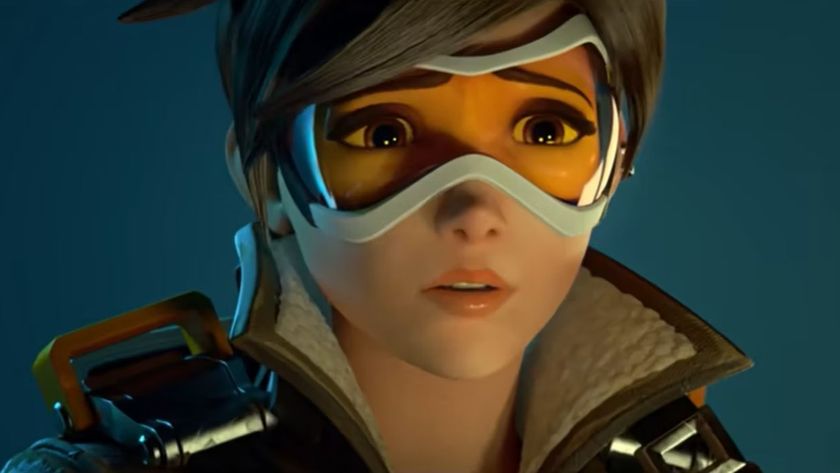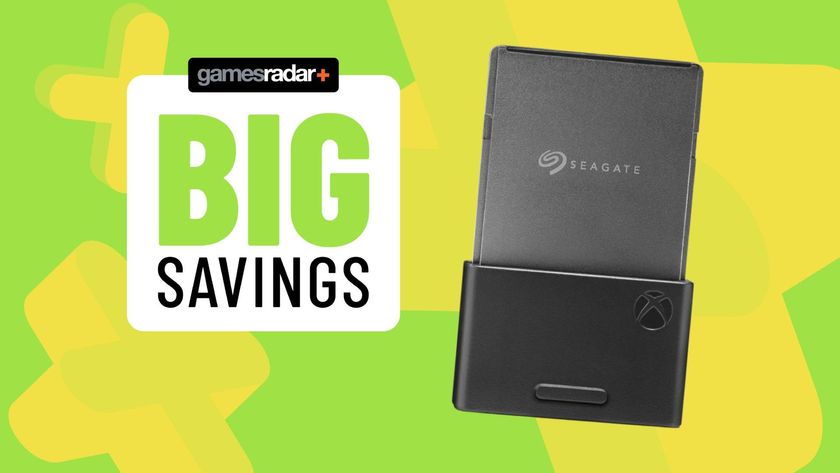I didn't care about Titanfall 2 until I met BT-7274
Bluntly put, Titanfall 2 didn’t interest me much at first. Then I met my Titan, BT-7274. I will never forget BT-7274. He alone made Titanfall 2 worth playing and transformed it into a lot more than an ordinary shooter. Pull up a seat and allow me to explain why, but be warned as I will be dropping some very big spoilers for the single-player campaign of Titanfall 2.
In the first Titanfall you play as a Pilot who can summon a Titan, a giant robotic exoskeleton (similar to the Jaegers in Pacific Rim), that you climb into and control to fight other players. Titanfall was solely based on multiplayer, so with Titanfall 2 I expected something along the same lines. Formidable, stoic Titans, largely used in multiplayer arenas, with as much personality as a toaster, that act as electrically-powered sets of armour. I certainly didn’t expect BT. When I first met him I thought him a run-of-the-mill Titan, there to be heavily relied upon and casually discarded. I was wrong. He’s a lot more than a mechanised exoskeleton. This Titan has his own ideas about the role you have to play, and goes beyond doing his duty, to turn you from an ordinary grunt wielding a gun into a Pilot, bonded until death with your Titan, BT-7274.
Typically in shooters you’re one of many soldiers, probably part of a squadron of other bog-standard cannon fodder with their own quirks (just to make sure they’re memorable) who gradually get killed off as the campaign goes on. You’ll end up as the last one standing, filled with vengeance for your fallen comrades, perhaps artfully wearing their dog tags around your neck. One of the risks Titanfall 2 takes with having a robot as a near-constant companion is that players might be less likely to warm up to him. Making him a playable non-human character is an even bigger risk. Think about it: if it’s difficult enough to maintain immersion while jumping between playing as different humans, how much harder will it be to remain invested in a game when you’re playing alongside (and as) a robot who doesn’t even have facial expressions?

With a human companion in ordinary shooters, I start my relationship with them having at least some common ground: namely, that we’re both homo sapiens. Traipsing along with a human companion guarantees that players will find something in common with them, something to empathise with by default, even if it is just your basic anatomy. But in Titanfall 2, although it initially seems like you’re rendered pointless, with BT being so much bigger and stronger than you - and at first appearing little more than a giant, walking, talking gun - you’re quickly given a reason to have faith in the Titan.
If you have to play for half of a level as a giant, tanking robot and the other as a quick, elusive human, it’s hard for a game to seamlessly transition between the two vastly different fighting styles whilst also maintaining your understanding of who you are and the role you have to play, as well as providing a decent reason for temporarily abandoning your favoured approach to combat. Titanfall 2 changes that completely. Some circumstances call for the nimble Pilot who coasts past soldiers at top speeds, firing as he goes. But when faced with open spaces you have to step into BT’s cockpit, take advantage of his armour, and sprint into the fray, letting loose a tirade of rockets as you attack other Titans head-on. BT makes adopting a different fighting style feel natural, because in my eyes it’s ambiguous whether I’m playing as BT or as the Pilot who’s controlling BT from the cockpit.
I prefer to think the former is the case - that I’m now protecting the Pilot and getting him from point A to B, firing as many bullets as possible along the way. I can’t get that ambiguity or seamless transition between combat styles if I could only play as a human. Switching between Pilot Cooper and BT makes me adapt my playstyle to complement each character’s different strengths, so during levels I feel a sense of natural harmony between the playing styles and particular talents of this agile soldier and a tanking robot, with the growing sense of symbiosis between us meaning that when I see BT silhouetted in the distance I become more determined than ever to reach him, more resolute that I will uphold the mission no matter what. This might sound a bit cliché, but Titanfall 2 has taught me some real-life lessons, as BT sets an example for me both in-game and in real life, showing that I should never give up, never be afraid to switch my approach, and above all, never abandon my friends.
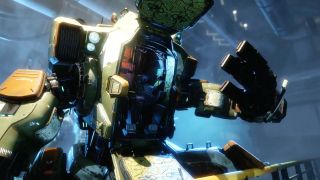
Titanfall 2 paves the way for freeing shooters of the human protagonist trope by showing that artificial constructs are just as trustworthy and sympathetic. BT doesn’t try to convince you he’s human. He’s a giant green Titan with shoulder-mounted rockets, and he doesn’t want you to forget that. For example, when faced with a gap of precisely 95 meters which I couldn’t possibly jump on my own, BT comes to the conclusion that the only way to get across is to throw me over the bottomless void. Titanfall 2 could have gone down a comedy route, making this scene into a “phew, wipes brow” moment, acknowledging that it could be ludicrous to trust a giant robot with your life when in you’re a tiny, squidgy bag of bones. Instead this moment is a turning point for your relationship with BT, as the game forces you to accept that you need BT’s help. In a discrete moment of sympathy BT just says "Trust me".
Sign up to the 12DOVE Newsletter
Weekly digests, tales from the communities you love, and more
This simple phrase opens a door. You can either go through it, or slam it shut in BT’s face and say goodbye to Titanfall 2. Quickly it becomes clear that BT can be relied upon, as his honest request for trust is backed up with empirical evidence that he’s dependable when you don’t end up as a red splat on the wall after the first throw. What would be an insurmountable obstacle in any other shooter is a cue to team up with BT, which makes it clear that this gargantuan Titan needs you to remember he’s a robot so that you understand that there are things you can’t do without him, and that there are also things he can’t do without you. Part of the unshakeable attachment I formed with BT was based on my realisation that I had limitations as a Pilot, and so did he as a Titan. Although when we were apart we were still formidable, together we were unstoppable.
BT shows that the Titans are no longer the characterless giant weapons they were in the first Titanfall, revolutionising how I feel about the Titans I kill as well, by adding emotional depth to a game which could have easily been dismissed as being solely about giant robot fights. Fighting the mercenaries in their Titans gave me a lot of bother at the time, but in hindsight I’m wondering about the relationship between them and their robots. Did their Titans have as much personality as BT? For all I know, the mercenaries might be distraught, their hearts breaking as I pump enough bullets into their Titans to rip their circuits to shreds.
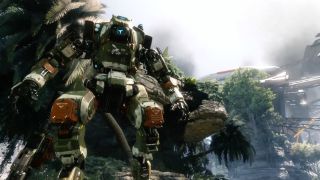
From a game design point of view it makes perfect sense to make them more than just walking weapons as the whole point of Titanfall 2 is that these Titans are a key part of gameplay and combat, so giving them some depth makes them feel more like a natural part of the game instead of a gimmick. The Titans are no longer just shells to be used when combat gets a little too tough, and although this might seem outlandish at first, giving BT three Protocols to follow underlines eventually the similarity between BT and the player. Mechanically recited by each Titan, they are: "Protocol one, link to Pilot; Protocol two, uphold the mission; Protocol three, protect the Pilot". Having these rigidly programmed into the Titan’s software could jeopardise any bond between Pilot and robot, as I know that the only reason he stays by my side is because he’s hardwired to. So am I suspicious of BT, more sceptical about his friendship because he doesn’t have any choice about protecting me?
No. Titanfall 2 completely rewrites the idea that robots are a neat, somewhat obligatory gambit only put in shooters to make them feel more futuristic. I take them for granted in other games, but having BT explain how his mind (or programming) works edges me towards thinking of the Titans as being almost a metaphor for the player’s drive to reach the end of a game. BT and I are alike, except his motivations are easier to overlook purely because it’s obvious he was engineered by humans. But this doesn’t mean that his emotions are fake. It means that I’m more conscious that I have the same Protocols programmed into my psyche and the same inability as BT to dismiss them.
Going far beyond creating a lovable companion just for the sake of the story, Titanfall 2 is a shooter based on learning how to cooperate with your Titan. This wouldn’t be any fun without allowing BT to learn from you too, done in part via the the dialogue choices, which also make the gameplay more dynamic as BT responds to what you say instead of just talking at you. As the game progresses he feels less like a necessary walking weapon and more like an ally to whom you can teach new things as your bond strengthens. I’m not ashamed to admit that I let out an audible squeal when BT gave me a thumbs-up after carefully watching me do the same moments before. Being able to teach him small gestures like that is something you could only do with a human if they’d been living under a rock, or an animal who somehow has opposable thumbs. That doesn’t mean BT is as innocently ignorant as a child; rather this small gesture is part of the growing friendship between you and the Titan, with a hint of pride mixed with delight on your part that BT is paying as much attention to your quirks as you are to his.
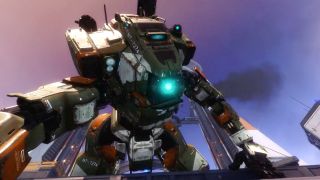
The entire span of Titanfall 2 is spent building the idea that you’re invincible with BT by your side; nimble when you need to be, durable when you have to be. But just when you’re starting to get the hang of switching between playing styles, Titanfall 2 rips the rug out from underneath your feet. You’re made to watch as BT gets slashed to pieces, and all the reasons he’s useful become irrelevant. It doesn’t matter that your main source of protection is gone. It doesn’t matter than you can’t fight Titans any more, and so strategically are screwed. It doesn’t matter that the MacGuffin the whole campaign is centred around is in BT’s cockpit. What matters is that your ally, your friend, is gone. You’re back to square one, and what’s staggering is just how horrendous it is seeing your Titan get hurt.
Titanfall 2’s masterstroke is making me care about a robot and being so shocked by his torture that I don’t care that I’ve been pushed back to being an ordinary grunt for half a level. Shooters tend to involve a lot of levelling up and discarding weapons as soon as a better one appears, so usually I’d just be irritated that I’d lost my hard-won, decimating gun and a mechanised get-out-of-jail-free card which could stomp enemies into pulp. But not this time.
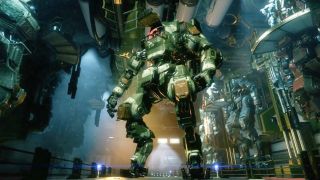
The Smart Pistol I wrenched out of BT’s eye socket perfectly matched the emotional daze I was in, as instead of aiming all I have to do is look down the sights, let it automatically lock onto targets, and then pull the trigger. With the ship exploding around me I was in no state to aim properly anyway, as I was doing my damnedest to get out and kill anyone who got in my way, whilst being haunted by the sight of BT’s ravaged body. If there was a voice in my ear, patched over from the mothership, telling me what to do and which bits to plug in where, I could have helped BT. I could have stopped his suddenly deeper, slower voice from slurring, and I could have reattached his battered limbs. But I can’t. I’m not an engineer. I can’t drag BT to safety either, and although I can carry his blue eye with me as I leave the ship in a fraught stupor, I’ve left behind his body, strung up and mauled like a broken puppet. After BT was torn limb from robotic limb I was far more distraught (and incandescent with rage) than I thought I’d be, as I knew I had failed him. His protocol might be to ‘protect the pilot’, but I couldn’t protect BT.
Dear god, that final cutscene which plays during the credits, of Cooper smiling, high-fiving, sauntering down the corridors as people cheered him along - I hated it. BT-7274 has just sacrificed himself for you, Cooper, so how the hell are you celebrating? I was an absolute mess by that point. Without BT, Titanfall 2 would have been a cookie-cutter shooter whose main gimmick - giant fighting robots - is just meant to be cool, and get the adrenaline pumping. But with BT, Titanfall 2’s single-player campaign is an intelligent, thoughtful way to make you reassess how much you rely on weapons to get by, and how helpless you are without them. Because it took losing my Titan to make me realise that BT isn’t just a mechanised suit of armour, his absence during one level not just a bit of a nuisance when it comes to tactics. He’s my friend who just happens to be able to destroy anything in his way. I can’t imagine Titanfall 2 without him. So congratulations, Respawn. This is the only time I’ll thank a team for making me into an emotional wreck, but I wouldn’t have it any other way.
While here at GamesRadar, Zoe was a features writer and video presenter for us. She's since flown the coop and gone on to work at Eurogamer where she's a video producer, and also runs her own Twitch and YouTube channels. She specialises in huge open-world games, true crime, and lore deep-dives.


